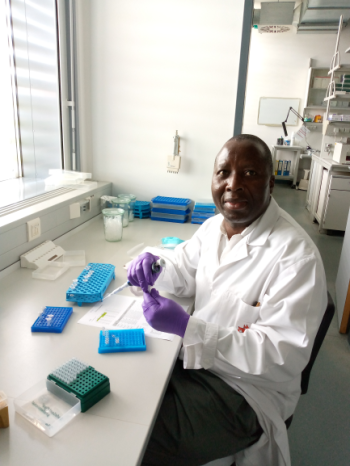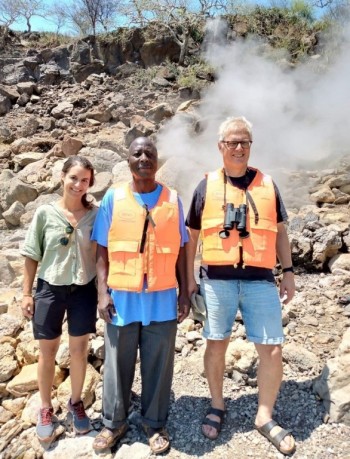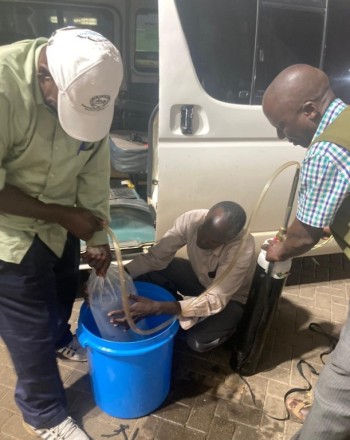Principal Investigator: Dr. James Barasa
This is a collaborative research project between the University of Eldoret, Kenya and the University of Potsdam, Germany.
Objective: The long-term aim is to develop an all-male tilapia strain for commercial aquaculture in Kenya. Economic production of farmed tilapias globally relies on use of all-male tilapia seed, since males grow faster than females, and mixed sex cultures lead to prolific breeding in culture facilities, yielding many small sized fish of low market value.
The Problem: Current methods of producing mono sex male tilapia seed are inefficient, technically complex, and require large facilities and pure tilapia species and strains, which are difficult to achieve at farms and hatcheries. Furthermore, the most common method, the use of steroids is environmentally unfriendly and only achieves at most 70-94% sex reversal of the batch. This potentially leads to spawning in culture, despite the farmer having purchased and paid for all-male tilapia seed from hatcheries. Such seed is also unsuitable for stocking in cages in Lake Victoria, as fry from breeding activities in cages escape to the open waters of the lake, where they negatively interact with natural tilapias of the lake. A more efficient and easier method of producing 100% all-male tilapia seed for use by farmers is therefore an urgent need.
The project: The approach involves studying molecular pathways of sex determination in tilapias, in combination with several strategies including sex reversal, hybridization, and genomic selection to develop a strain that yields 100% all-male fry.
The first phase is underway, initiated last year with the visit to Germany by the Kenyan PI, James Barasa. During the visit, requisite genomic resources were developed, tested, and validated via laboratory analyses, at the University of Potsdam. The visit was supported by the German Research Fund (DFG) and the Third World Academy of Sciences (TWAS).
The second phase of the project was initiated this year, by the visit of the PI from Germany, Prof. Dr. Ralph Tiedemann, and co-PI Dr. Marisol Dominguez to the University of Eldoret, Kenya, in September. During the visit, the researchers undertook joint fieldwork, for fish sampling at different lakes and fish farms. They also carried out technical backstopping and discussions with members of the management committee for the Fish Genetics and Genomics Training and Research Laboratory. Their visit and fieldwork were supported by the University of Potsdam Research grant for collaborative activities in sub-Saharan Africa.
Next steps: The project will seek support from diverse funding streams to support research work, especially by postgraduate students, both at the Fish Genetics and Genomics Training and Research Laboratory and fish hatchery at the University of Eldoret, Kenya, as well as at the Institute of Evolutionary Biology and Biochemistry at University of Potsdam, Germany.
Activities for 2025
With the financial support of the University of Potsdam, Germany, we were able to run a series of activities in September, 2025, as part of the activities under this project. Specifically, we did the following:
1. Held a hands-on training course on Molecular biology techniques and bioinformatics analysis for post graduate students of University of Eldoret, at the Fish Genetics and Genomics training laboratory. The training was facilitated by a team of collaborators from the University of Potsdam (Prof. Dr. Ralph Tiedemann, Dr. Feng Cheng and Anja Ernst). DNA extraction and quantification, as well as determination of purity via gel electrophoresis. PCR reactions were carried out at the lab. Data analysis using a suit of analytical software was mounted and individualized guidance provided to each trainee. These were interspersed with some lecture sessions, for theoretical perspectives and understanding.

Ms. Anja Ernst demonstrating some activities during the hands-on practical session at the Fish Genetics and Genomics laboratory, University of Eldoret.

Anja Ernst, Ralph Tiedemann and Feng Cheng with some of the trainees at the laboratory.
2. Carried out field expedition to Lake Turkana at Kalokol, Kenya, to collect live samples of Nile tilapia from the lake. We did this together with a team from the Kenya Marine and Research Institute (KMFRI) Kalokol station, under the leadership of Mr. Malala and Mr. Obiero.

The team on the motor boat in Lake Turkana during the fishing expedition

Fishing for Nile tilapia fry in lake Turkana

LR: James Barasa, Anja Ernst, Feng Cheng, Purity Mukhongo (MSc student, Mbarara University of Science and Technology) and Ralph Tiedemann on the beach, Lake Turkana after collection of live tilapias
3. After the exercise, Ms. Purity Mukhongo, an alumnus of the University of Eldoret, was able to travel to Potsdam, to join Ralph Tiedemann’s lab team for her MSc thesis research stay. During this Fellowship, she will perform laboratory analysis on Kenyan tilapia samples for some aspects of sex determining loci. Her research work at Potsdam is supported by the DAAD, after which she will go back to Mbarara University of Science and Technology, Uganda, to complete her studies.



